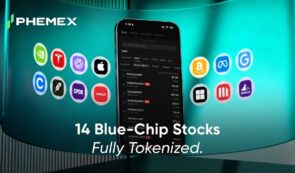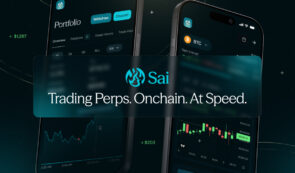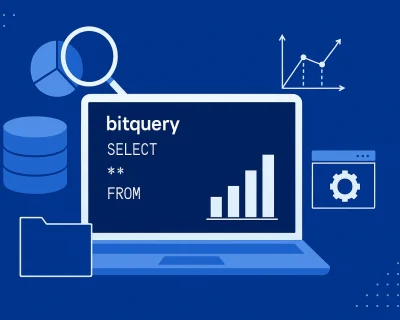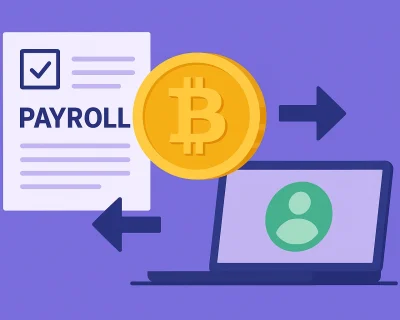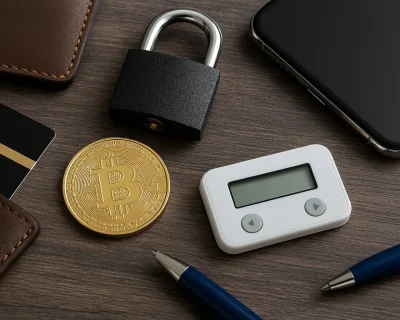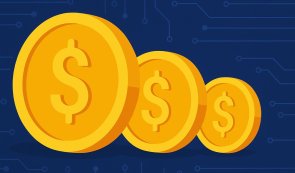6 Best DeFi Wallets Beyond 2025 (TESTED and TRUSTED)
In the DeFi industry, securing your digital assets should be a top priority to safeguard your investments. A key part of this security is choosing the right wallet.
So, how do you make the best choice, and why should you consider a DeFi wallet? Although the differences may not seem obvious at first, selecting a reliable DeFi wallet instead of a regular crypto wallet can save you time, protect your assets, and open up more opportunities in decentralized finance.
In this guide, we’ll explore the best DeFi wallets to meet your needs. Let’s get started!
Best DeFi Wallets to Choose Beyond 2025: In-a-Nutshell
In a nutshell, based on our thorough research and analysis, we’ve identified the top DeFi wallets to help you easily find the best option. We’ve included four software wallets and two hardware wallets to cover a range of needs.
Software wallets:
- MetaMask – Best Overall Software DeFi Wallet
- Trust Wallet – Top DeFi Wallet for BNB Chain
- Coinbase Wallet – Best for Beginners
- Nonbank – Most Functional Crypto DeFi Wallet
Hardware wallets:
- Trezor Safe 5 – Best Overall Hardware DeFi Wallet
- Ledger Stax – Best Hardware Wallet for Multichain Asset Management
For detailed information on each, continue reading below.
Best DeFi Wallets Beyond 2025: Software Wallets
1. MetaMask – Best Software DeFi Wallet Overall
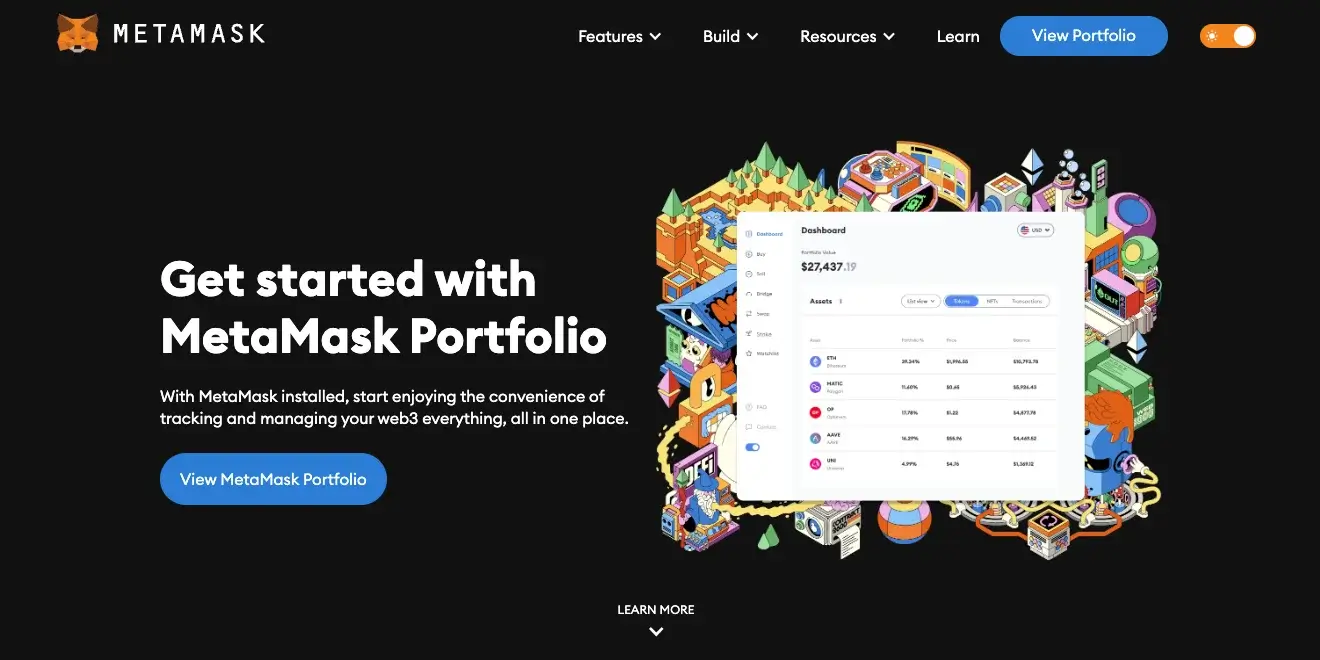
- Non-custodial wallet
- Hot wallet
MetaMask, first released in 2016, is a very popular crypto wallet for interacting with the Ethereum blockchain.
Developed by ConsenSys, we consider it the best software DeFi wallet out there, with more than 30 million people using it monthly.
The MetaMask community is strong, with millions of users and plenty of resources to help grow the project.
Using MetaMask lets you easily and safely create your own keys and passwords on your devices, keeping your information and accounts private, as only you control what you share.
MetaMask’s Main Features
1. DeFi Gateway – MetaMask serves as a gateway to decentralized finance (DeFi) on Ethereum, giving you access to thousands of decentralized apps (dApps) and Web3 projects, all from one wallet.
2. Token Swapping – With MetaMask Swap, you can easily exchange tokens directly within the wallet, which is available on both the browser and mobile versions. It pulls prices from multiple decentralized exchanges (DEXs) to get you the best deal with minimal slippage. MetaMask includes a small fee of 0.875% within the quoted price.
3. Buy Crypto with Fiat – MetaMask allows you to purchase cryptocurrencies using fiat currency.
4. Cross-Chain Transfers – MetaMask Bridge enables seamless token transfers across blockchains, optimizing routes for cross-chain transactions by utilizing data from multiple bridge aggregators.
5. Staking – You can stake tokens like ETH and MATIC directly from MetaMask using integrated liquid staking platforms, making earning rewards on your holdings easier.
6. Privacy Alerts – MetaMask includes privacy-focused alerts that help you identify potentially harmful dApps.
7. Identity Protection Vaults – MetaMask ensures your identity is protected with secure vaults, making it safe to interact with various tokens and dApps across different browsers.
8. Smart Transaction Processing – MetaMask offers smart transaction handling, allowing transactions to be processed in a virtual memory pool before being confirmed on the blockchain.
MetaMask Pros
- Full control over your private keys and funds.
- Easily connects to lots of decentralized apps (dApps) on Ethereum.
- Use “Snaps” to add extra functions to your wallet.
- Works with Ethereum and other similar networks.
- Available as a browser extension as well as an app on both iOS and Android.
- Can be used with hardware wallets like Ledger and Trezor.
MetaMask Cons
- It only supports Ethereum and similar blockchains, not Bitcoin or Solana.
- The interface isn’t easy for new users, and support is limited.
2. Trust Wallet – A Top DeFi Wallet for BNB Chain

- Non-custodial wallet
- Hot wallet
Trust Wallet is our second choice when it comes to software DeFi wallets. As a decentralized, non-custodial wallet, it gives you full control over your cryptocurrencies and NFTs. Endorsed by Binance, it’s the official crypto wallet supported by them since the start.
A key feature of Trust Wallet is its ability to safely interact with decentralized applications (dApps) across multiple blockchains. With it, you can buy, send, receive, stake, trade, and securely store cryptocurrencies.
As a hot wallet, Trust Wallet stays connected to the internet, allowing you to access your funds anytime from anywhere with an internet connection. It’s available as a mobile app and browser extension, supporting over 65 blockchains and more than 4.5 million digital assets.
Trust Wallet’s Main Features
1. dApp Browser – Trust Wallet lets you access dApps like Uniswap, Compound, and Aave. You can also explore NFT marketplaces such as OpenSea to buy, sell, or collect NFTs.
2. Security Measures – Trust Wallet keeps your data safe with features like biometric access, auto-lock timers, encrypted private keys, a 12-word seed phrase, and two-factor authentication (2FA). You can also connect it to a hardware wallet, like Ledger, for extra security.
3. Staking Rewards – Trust Wallet supports staking for over 23 cryptocurrencies. You can earn rewards based on each coin’s annual percentage rates (APRs) shown within the wallet.
4. Flexible Crypto Purchasing – You can buy cryptocurrencies through third-party providers like Mercuryo, MoonPay, and Simplex, giving you several options for acquiring digital assets.
5. Custom Token Integration – Easily add custom tokens by tapping the “Wallet” tab, clicking the “+” button, and searching for the token you want to add.
6. Inter-Wallet Transfers – Transfer cryptocurrencies from other wallets to Trust Wallet quickly and securely, using various authentication methods.
Trust Wallet Pros
- Trust Wallet supports millions of cryptocurrencies and tokens across different blockchains.
- Binance endorses the wallet.
- Good multichain when employing the in-wallet browser on mobile applications.
- You can interact with a wide range of dApps directly from the wallet.
- Trust Wallet offers staking for over 23 cryptocurrencies.
- The wallet is audited and certified by security firms like CertiK, Kudelski Security, and Halborn.
- You can connect the Trust Wallet to a Ledger hardware wallet for additional protection.
Trust Wallet Cons
- The wallet has fewer educational resources and customer support options compared to other wallets.
- The Android version isn’t updated as often as the iOS version, which gets more frequent maintenance and updates on GitHub.
- A native desktop wallet is not available.
3. Coinbase Wallet – Best DeFi Wallet for Beginners
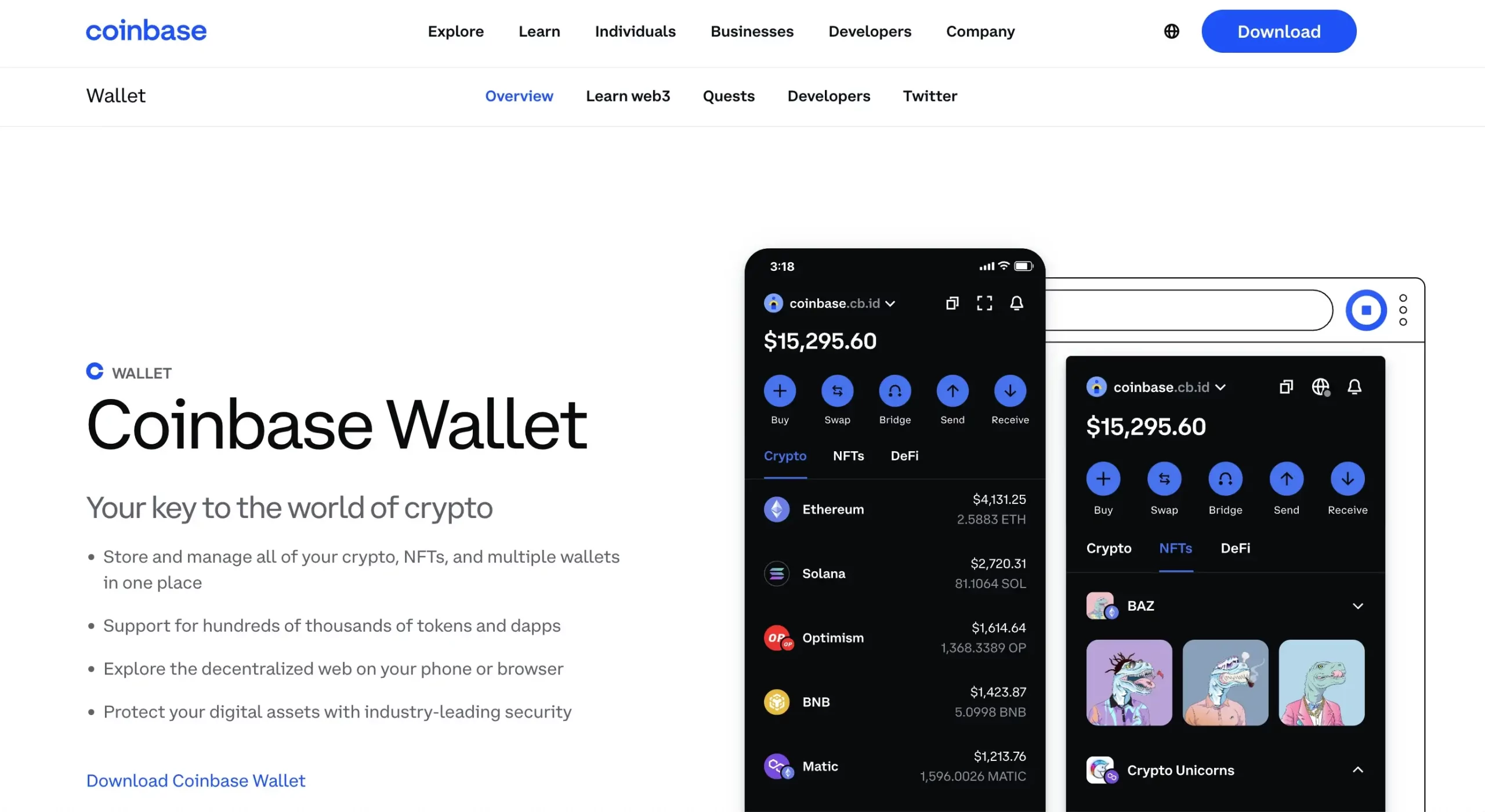
- Non-custodial wallet
- Hot wallet
Coinbase Wallet is a beginner-friendly, non-custodial decentralized wallet that’s designed to securely store and manage your cryptocurrencies and NFTs. With support for over 100,000 digital assets and seamless access to decentralized apps (dApps), it’s a great starting point for anyone new to crypto and DeFi.
Compared to other wallets like MetaMask, Coinbase Wallet is ideal for those just getting started. It’s designed to be easy to use, with a simple installation and setup process. It also offers plenty of features for more advanced users who are interested in decentralized finance.
With Coinbase Wallet, you can do a lot: stake assets, manage NFTs, swap crypto assets, and interact with thousands of dApps and Web3 projects.
Coinbase Wallet’s Main Features
1. DeFi Hub – Coinbase Wallet lets you analyze and search for thousands of dApps from different ecosystems.
2. Swap, Trade, and Buy – This wallet lets you swap over 100,000 cryptocurrencies directly within the app across several major networks, including Polygon, Ethereum, and Solana.
3. Easy Setup for Beginners – The wallet is available as a browser extension for Chrome and Brave, as well as on mobile for iOS and Android, making it simple to set up on your preferred device.
4. Privacy – it allows you to send and receive cryptocurrencies using just your username—no need for personal details.
5. Strong Security – This wallet is known for its strong security and is backed by the Coinbase exchange itself. As a non-custodial wallet, you fully own your private keys. The wallet offers features like biometric access, password protection, two-factor authentication (2FA), and a security lock for added protection.
6. Hardware Integration – You can integrate a Ledger hardware wallet to store your funds in cold storage.
Coinbase Wallet Pros
- Along with regular staking, you can stake liquid ETH directly from the wallet.
- The wallet is simple to set up and use, making it great for those new to crypto.
- Available as both a browser extension and a mobile app, making it accessible and versatile.
Coinbase Wallet Cons
- Isn’t available a desktop version.
- In the past, Coinbase’s customer support has received criticism for being slow or unhelpful.
4. Nonbank – Best Crypto DeFi Wallet for Functionality
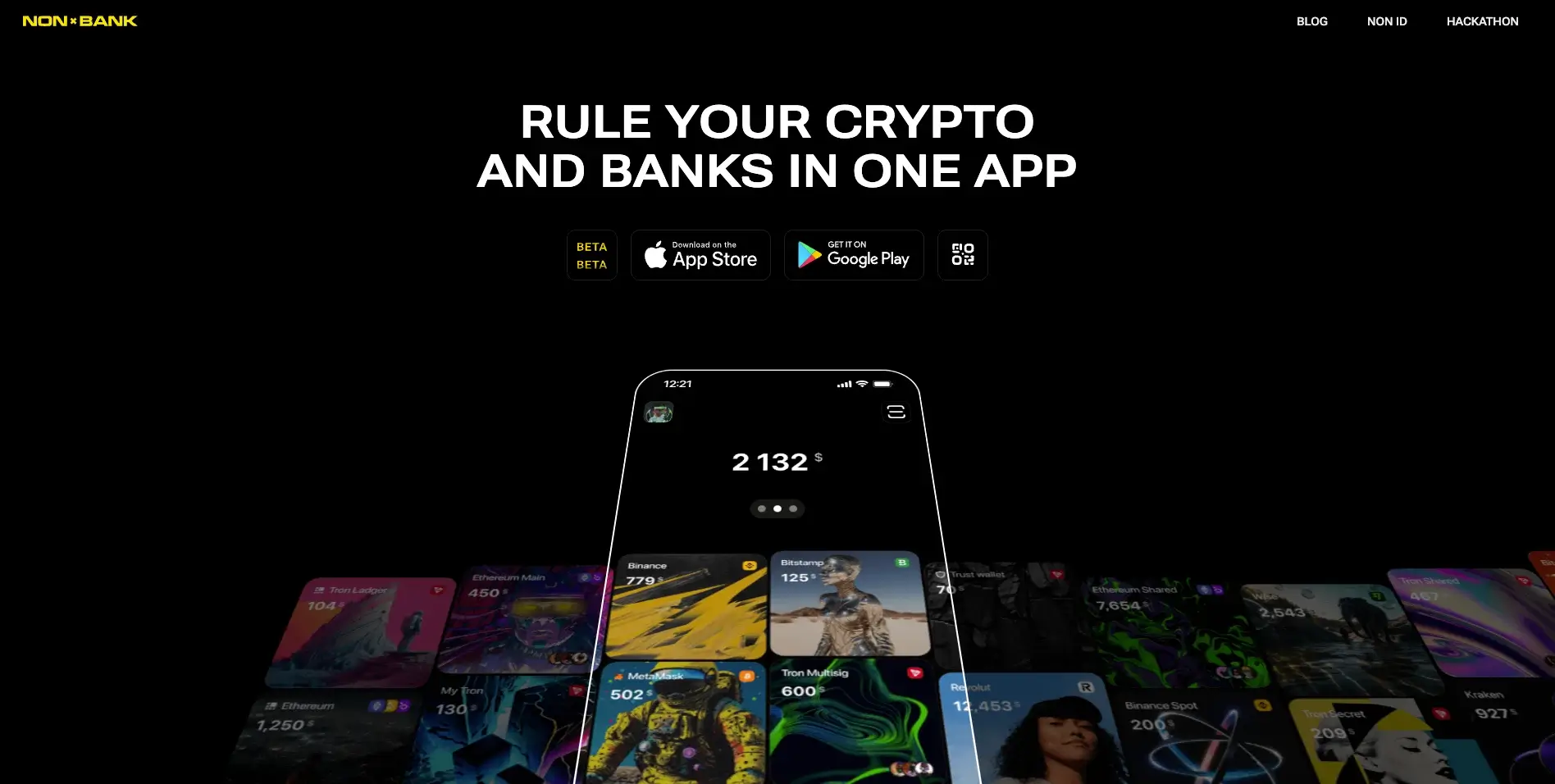
- Both custodial and non-custodial wallet
- Hot wallet
Nonbank is an all-in-one financial management platform that blends both custodial and non-custodial services. They aim to redefine how people manage their finances by combining traditional banking with the power of DeFi.
By integrating traditional banking features with the latest in decentralized finance (DeFi), Nonbank offers a new way to manage your finances.
So, Nonbank is not just another crypto wallet – it’s a platform where you can manage your assets across banks, wallets, and exchanges in one place.
Its innovative approach to security, asset management, and ease of use positions it as a game-changer in the financial industry.
And as it continues to grow, Nonbank has the potential to become the go-to platform for complete financial management.
Nonbank’s Main Features
1. Unified Asset Management – Nonbank allows you to connect all your financial accounts into one platform. Whether you have multiple bank accounts, cryptocurrency wallets, or exchanges, Nonbank organizes everything in “Spaces” for easier management.
2. Safe Transactions with AML Watchtower – Nonbank includes an AML (Anti-Money Laundering) watchtower, ensuring all transactions are secure and transparent.
3. Support for Multiple Assets – While Nonbank initially supports a limited number of cryptocurrencies, the goal is to expand to a wide range of digital assets. From major coins like Bitcoin and Ethereum to lesser-known cryptocurrencies, you’ll be able to manage them all within one app.
4. Seamless Crypto Exchange – Nonbank makes buying, selling, and trading cryptocurrencies quick and easy. You don’t need to switch between different platforms – everything is built into the app for smooth transactions.
5. Connect to Hardware Wallets – For added security, you can connect a hardware wallet to Nonbank.
6. Asset Analytics – Nonbank provides detailed analytics to help you track and manage your assets across different Spaces and currencies.
Nonbank Pros
- All-in-one financial management platform.
- The AML Watchtower ensures secure, transparent transactions.
- Nonbank will expand to support a wide variety of cryptocurrencies.
- Integrated crypto exchange.
- Connect a hardware wallet for added security.
- Use built-in analytics to manage and track your finances effectively.
Nonbank Cons
- The initial release will support a smaller number of cryptocurrencies, though this will expand over time.
- Currently, Nonbank is available only as a mobile app.
Best DeFi Wallets Beyond 2025: Hardware Wallets
1. Trezor Safe 5 – Best DeFi Wallet Overall (Hardware)
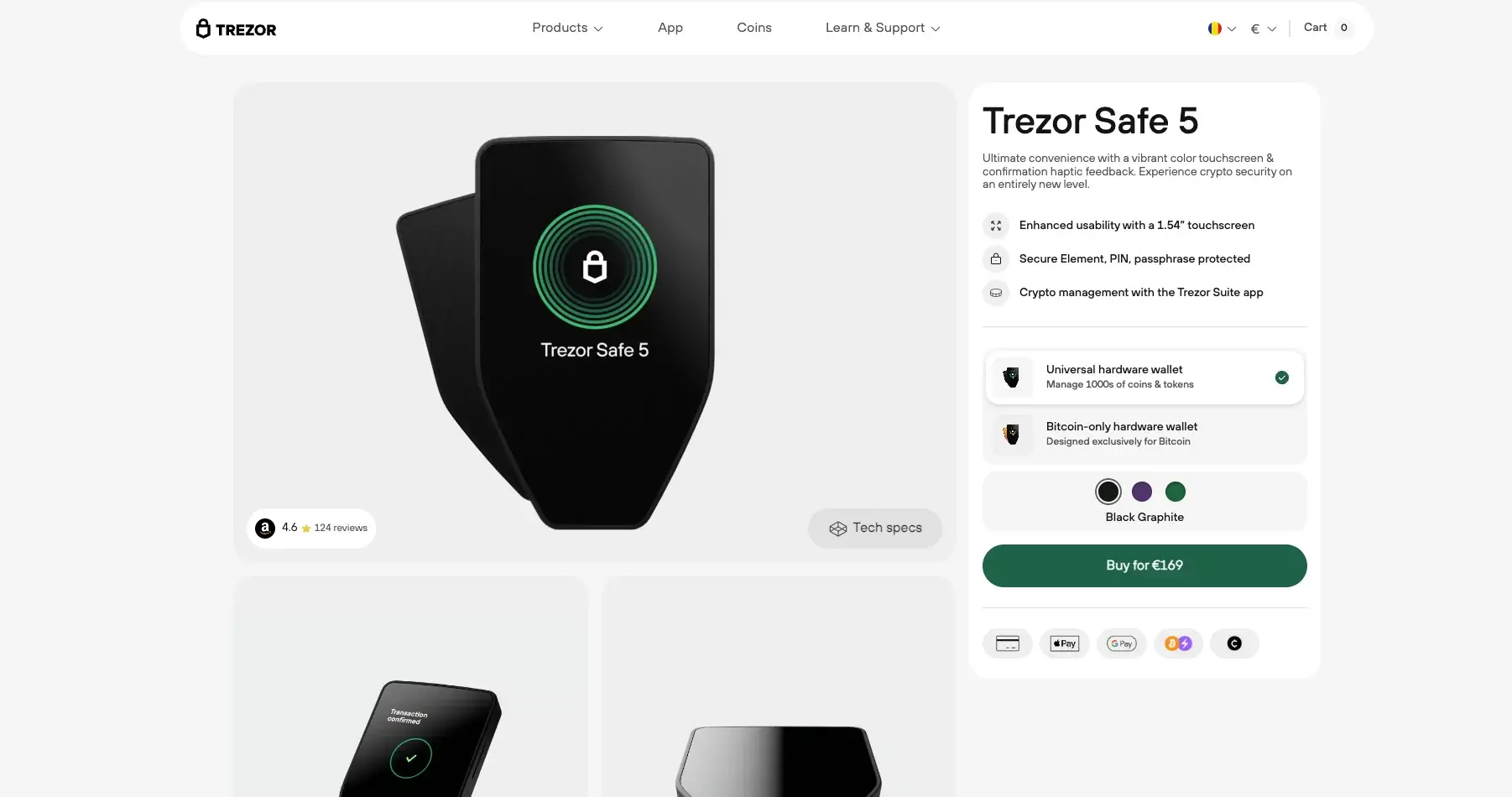
- Non-custodial wallet
- Cold wallet
The Trezor Safe 5 is the latest hardware wallet from Trezor, designed for users who value top-notch security and ease of use. We consider it the best DeFi crypto wallet you can opt for if you want a hardware wallet.
With its colorful touchscreen and intuitive haptic feedback, it’s a great option for managing your cryptocurrencies. Whether you’re dealing with multiple coins or focusing on Bitcoin, the Trezor Safe 5 offers robust protection and a seamless experience.
As it has a wide range of features, including support for over 1,000 coins, top-tier security protocols, and privacy tools, it’s an ideal hardware wallet for each crypto enthusiast.
Trezor Safe 5’s Main Features
1. Multiple Wallet Options – The Trezor Safe 5 comes in two versions – a universal wallet that supports over 1,000 cryptocurrencies and a Bitcoin-only version for users who only need to manage Bitcoin.
2. Color Touchscreen – The 1.54-inch color display (240×240 pixels) with Gorilla® Glass 3 provides a clear, scratch-resistant interface that’s easy to navigate.
3. Haptic Feedback – The Trezor Touch haptic engine offers tactile feedback, making the device feel responsive and user-friendly.
4. Secure Element Protection – The wallet features an NDA-free EAL 6+ Secure Element chip, ensuring high-level security against online and offline threats.
5. PIN and Passphrase Protection – Your assets are secured by PIN and passphrase protection, with on-device entry to prevent keylogging or remote hacking attempts.
6. Advanced Backup and Recovery – The Trezor Safe 5 supports 12-, 20-, and 24-word wallet backups. It also introduces an Advanced Multi-share Backup option for even more robust recovery security.
7. Seamless Integration – The device integrates with the Trezor ecosystem, including desktop and mobile apps, making it simple to buy, sell, and trade cryptocurrencies directly from your hardware wallet.
8. Privacy Enhancements- The wallet supports coin control to enhance transaction privacy and can be used with the Tor network to protect your identity.
9. Authentication – Trezor Safe 5 also functions as a two-factor authentication (2FA) device using the FIDO2 Standard, adding an extra layer of security for your accounts.
10. MicroSD Card Slot – A microSD card slot allows additional storage or further security features.
Trezor Safe 5 Pros
- The universal version handles a wide variety of coins, while the Bitcoin-only version is available for dedicated Bitcoin users.
- Features a Secure Element chip (EAL 6+) for top-level protection, along with PIN, passphrase, and advanced backup options.
- The color touchscreen and haptic feedback make it simple to navigate, even for beginners.
- Integrated coin control and Tor compatibility help protect your transactions and identity.
- It offers multiple wallet backup options, including a more secure multi-share backup.
Trezor Safe 5 Cons
- The advanced features and enhanced security come with a higher price tag than other hardware wallets.
- Requires a USB-C connection, which may be less convenient for users without compatible devices.
- Unlike some competitors, the Trezor Safe 5 does not offer Bluetooth or other wireless options for connection.
2. Ledger Stax – The Best Hardware DeFi Wallet for Multichain Asset Management
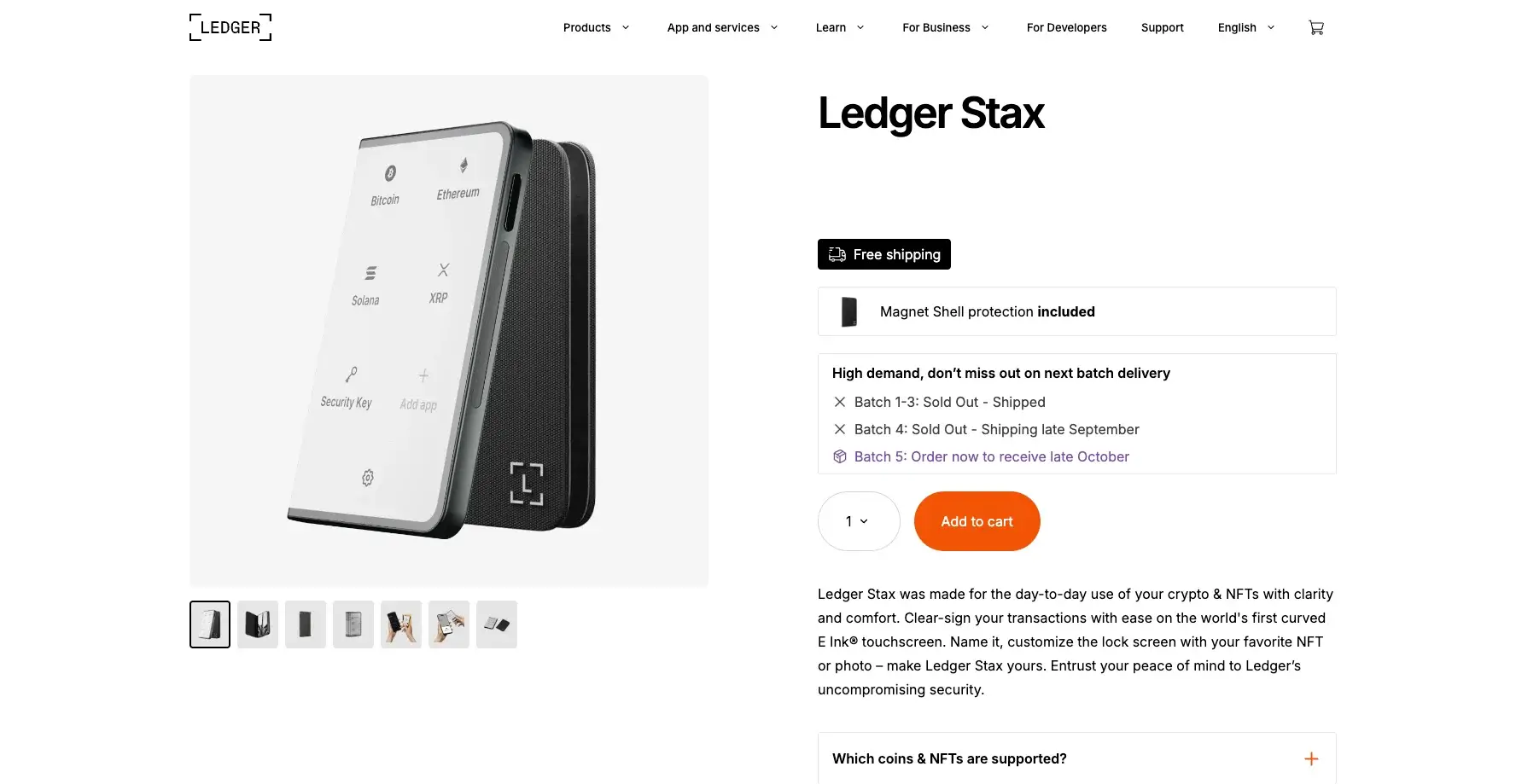
- Non-custodial wallet
- Cold wallet
Ledger Stax is one of the best cold storage devices for safely keeping your crypto offline. It’s a great option for users who prioritize security but still want to engage in DeFi activities.
With Ledger Live, users can connect their wallets to a smartphone or computer, giving them access to decentralized applications (dApps) without moving their assets online.
Ledger Live also allows users to swap between supported cryptocurrencies and stake their assets, providing a stable bridge to DeFi platforms. It’s available for both mobile and desktop, offering a user-friendly interface with all the essential DeFi tools.
Ledger’s Main Features
1. Offline Crypto Storage – Ledger is a cold wallet, meaning it keeps your cryptocurrencies completely offline.
2. Online DeFi Access via Ledger Live – Through the Ledger Live app, you can connect to dApps and manage your assets without compromising security. You can stake, swap, or interact with DeFi protocols while keeping your private keys safe on the device.
3. Third-Party Wallet Support – Ledger is compatible with several hot wallets like MetaMask and OKX, letting users connect to thousands of decentralized applications without having to transfer their crypto out of the wallet.
4. Wide Asset and Chain Support – Ledger Stax supports thousands of cryptocurrencies across more than 70 blockchain networks.
Ledger Pros
- Cold storage means your assets are kept offline, greatly reducing the risk of hacking.
- Ledger Live enables secure access to decentralized apps and DeFi platforms without moving your funds.
- Ledger offers wallet recovery options, providing peace of mind in case of device loss or damage.
Ledger Cons
- Connecting to external wallets like MetaMask can reduce the wallet’s security to some extent.
- The process of connecting to online applications through Ledger Live can be a bit more complex than hot wallets.
Coindoo’s Methodology for Picking the Best DeFi Wallets
At Coindoo, our selection process for the best DeFi wallets is based on a comprehensive evaluation of several critical factors. As the decentralized finance (DeFi) ecosystem continues to expand, it is essential to have a reliable and secure wallet to manage and protect your assets.
Our methodology ensures that we recommend wallets that provide the best combination of functionality, security, and user experience. Here’s a detailed breakdown of the criteria we use to evaluate DeFi wallets:
Security and Privacy
Security is vital when dealing with digital assets. Our top priority is ensuring that the wallets we recommend offer robust security features to protect users’ funds and private keys. We assess wallets based on the following:
1. Private Key Control – The most secure wallets allow users to maintain full control of their private keys, which is important for accessing and managing assets. We give preference to non-custodial wallets, as they enable users to retain ownership of their keys, reducing the risk of centralized failures or third-party breaches.
2. Encryption and Authentication – Strong encryption, two-factor authentication (2FA), and biometric authentication (such as fingerprint or facial recognition) are important features we look for to ensure added layers of protection.
3. Reputation and Track Record – We also review the wallet’s history, looking for security audits, the number of security incidents, and how well those incidents were handled.
Compatibility and Integration with DeFi Protocols
A DeFi wallet (as you can guess) should provide seamless access to decentralized applications (dApps) and DeFi protocols such as decentralized exchanges (DEXs), lending platforms, and yield farming services. We assess:
1. Multi-Chain Support – Since the DeFi space spans multiple blockchain networks like Ethereum, Binance Smart Chain, and Polygon, we prioritize wallets that support a wide range of tokens and multiple blockchains.
2. DApp Integration – A wallet that offers built-in support for DeFi platforms makes it easier for users to engage in decentralized finance activities like staking, borrowing, lending, or swapping tokens. Wallets with smooth dApp browsing and integration improve the user experience significantly.
User Experience and Interface
The best DeFi wallets should be intuitive and accessible to both beginners and experienced users. We evaluate:
1. Ease of Use – Wallets should offer a clean, user-friendly interface that makes it easy to steer, even for users who are new to DeFi. This includes clear instructions on how to send, receive, and manage tokens.
2. Mobile and Desktop Compatibility – Many users prefer wallets that are accessible on multiple devices. We consider wallets that provide mobile apps (iOS and Android), browser extensions, and desktop versions to accommodate different user preferences.
3. Transaction Management – A well-designed wallet should make it easy to view transaction histories, track balances, and monitor network fees.
Backup and Recovery Options
Losing access to a wallet due to forgotten credentials or device failure is a major concern for users. We evaluate the wallet’s recovery mechanisms to ensure that:
1. Backup Methods – Wallets should offer secure and easy-to-use backup options, such as seed phrases or mnemonic phrases, which allow users to recover their wallets in case of loss or damage to the device.
2. Restoration Process – We examine how simple and reliable the wallet’s recovery process is and whether it can be completed without technical expertise. Wallets with clear, well-documented recovery instructions score higher in our reviews.
Community Trust and Feedback
Community feedback and trust are crucial when selecting the best DeFi wallets. We take into account:
1. User Reviews and Ratings – We assess reviews on platforms like Reddit, Trustpilot, and App Stores (Google Play and Apple Store) to gauge real-world user satisfaction. Positive feedback from the community signals reliability and trustworthiness.
2. Reputation in the DeFi Space – We also consider the wallet’s standing within the broader DeFi ecosystem. Wallets with strong community support, active development, and regular updates are generally more reliable and trusted.
Open Source and Development Transparency
We value transparency, especially when it comes to open-source wallets, as they allow anyone to audit the code and identify potential vulnerabilities. Our methodology includes:
1. Open Source Code – Wallets that publish their source code allow for community-driven auditing, which enhances security and trust. We prioritize wallets that have been independently audited by reputable security firms or have been thoroughly reviewed by the developer community.
2. Active Development – Wallets that regularly release updates and security patches are more likely to be secure and responsive to the evolving needs of the DeFi ecosystem. We look at the development team’s activity, including how quickly they respond to bug reports or issues.
Fees and Cost Structure
While many DeFi wallets are free to use, transaction fees can vary depending on the blockchain network and wallet provider. We assess:
1. Transaction Fees – We review the costs associated with sending and receiving tokens and whether the wallet provides options to adjust gas fees to optimize transactions during network congestion.
2. Hidden Costs – Some wallets may have hidden fees for certain features or transactions. We ensure transparency in our recommendations by highlighting any fees users may encounter, such as those for token swaps or additional premium services.
Innovation and Extra Features
Lastly, we consider innovative features that add value to the user experience. This can include (but not limited to):
1. Multi-Signature Support – Wallets that support multi-signature (multi-sig) transactions provide an extra layer of security, requiring multiple parties to approve a transaction.
2. DeFi Tools and Analytics – Some wallets offer built-in tools for portfolio tracking, asset management, or DeFi analytics, which can enhance a user’s ability to optimize their DeFi strategies.
3. Cross-Platform Syncing – Wallets that allow users to sync their accounts across multiple devices (mobile and desktop) provide added convenience and flexibility.
What is a DeFi Wallet?
A DeFi wallet is a digital tool designed for securely storing, sending, and receiving decentralized tokens, as well as interacting with decentralized finance (DeFi) platforms.
Unlike traditional wallets, which hold physical currency, a DeFi wallet stores cryptographic keys—specifically, a public key and a private key—that allow users to access and manage their assets on the blockchain.
- Public Key – This functions as your wallet’s address, similar to a bank account number or an email address. It’s the information you share with others to receive tokens.
- Private Key – This is a unique and confidential code that proves ownership of the wallet and provides access to the assets. Keeping this key secure is vital, as it grants full control over the wallet.
Basically, the wallet doesn’t hold your tokens directly. Instead, it provides secure access to them by connecting to the blockchain, where all token transactions are recorded and verified.
The cryptographic keys enable you to sign transactions and interact with decentralized applications (dApps) in a trustless environment.
FAQs
Are DeFi Wallets Safe to Use?
DeFi wallets can be secure, but like any digital asset, they carry risks. It’s important to take precautions to protect your wallet, such as avoiding linking it to unreliable platforms and using strong, unique passwords.
Can a DeFi Wallet Be Used for Staking?
Yes, many DeFi wallets support in-wallet staking. This allows you to earn rewards by holding cryptocurrencies on a proof-of-stake (PoS) network. Additionally, you can often connect your DeFi wallet to staking portals of various POS networks and decentralized applications (dApps).
What is the Best Crypto DeFi Wallet?
The “best” DeFi wallet depends on your specific needs and preferences. MetaMask is a popular choice, particularly for those primarily focused on the Ethereum network. However, other wallets may be more suitable for different blockchains or offer specialized features. It’s recommended that you research and compare various options to find the one that best aligns with your requirements.
Conclusion
So, choosing the right DeFi wallet is important for protecting your crypto assets.
Whether you prioritize the security of a hardware wallet or the convenience of a software wallet, safeguarding your private key is key.
With the right wallet, you’re prepared to explore DeFi securely.
